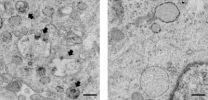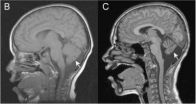(Press-News.org) Unclogging the body's protein disposal system may improve memory in patients with Alzheimer's disease (AD), according to a study from scientists at Kyungpook National University in Korea published in The Journal of Experimental Medicine.
In AD, various biochemical functions of brain cells go awry, leading to progressive neuronal damage and eventual memory loss. One example is the cellular disposal system, called autophagy, which is disrupted in patients with AD, causing the accumulation of toxic protein plaques characteristic of the disease. Jae-sung Bae and colleagues had earlier noted that the brains of AD patients have elevated levels of an enzyme called acid sphingomyelinase (ASM), which breaks down cell membrane lipids prevalent in the myelin sheath that coats nerve endings. But whether increased ASM directly contributes to AD (and if so, how) was unclear.
The group now finds that these two defects are linked. In mice with AD-like disease, elevated ASM activity clogged up the autophagy machinery resulting in the accumulation of undigested cellular waste. Reducing levels of ASM restored autophagy, lessened brain pathology, and improved learning and memory in the mice. Provided these results hold true in humans, interfering with ASM activity might prove to be an effective way to slow—and possibly reverse—neurodegeneration in patients with AD.
INFORMATION:
Lee, J.K., et al. 2014. J. Exp. Med. doi:10.1084/jem.20132451
About The Journal of Experimental Medicine
The Journal of Experimental Medicine (JEM) is published by The Rockefeller University Press. All editorial decisions on manuscripts submitted are made by active scientists in conjunction with our in-house scientific editors. JEM content is posted to PubMed Central, where it is available to the public for free six months after publication. Authors retain copyright of their published works and third parties may reuse the content for non-commercial purposes under a creative commons license. For more information, please visit http://www.jem.org .
Research reported in the press release was supported by the National Research Foundation (NRF) of Korea.
Study links enzyme to Alzheimer's disease
2014-07-21
ELSE PRESS RELEASES FROM THIS DATE:
Healing the heart with fat
2014-07-21
Too much dietary fat is bad for the heart, but the right kind of fat keeps the heart healthy, according to a paper published in The Journal of Experimental Medicine.
Unsaturated dietary fatty acids, such as eicosapentaenoic acid (EPA), are known to protect against cardiovascular diseases. However, the mechanism and the specific fat metabolites responsible for this protection were unknown.
A group of Japanese scientists now show that mice engineered to produce their own EPA are protected against heart disease and have improved cardiac function. One particular EPA metabolite, ...
When temperatures get cold, newly-discovered process helps fruit flies cope
2014-07-21
Cold-blooded animals cannot regulate their body temperature, so their cells are stressed when facing temperature extremes. Worse still, even at slightly colder temperatures, some biological processes in the cell are slowed down more than others, which should throw the cells' delicate chemical balance out of whack. Yet, those cells manage to keep their biological processes coordinated. Now researchers from the University of Rochester and the European Molecular Biology Laboratory have found out how they do that.
"The production of proteins is a key process in all cells, ...
Scientists successfully generate human platelets using next-generation bioreactor
2014-07-21
Boston, MA – Scientists at Brigham and Women's Hospital (BWH) have developed a scalable, next-generation platelet bioreactor to generate fully functional human platelets in vitro. The work is a major biomedical advancement that will help address blood transfusion needs worldwide.
The study is published July 21, 2014 in Blood.
"The ability to generate an alternative source of functional human platelets with virtually no disease transmission represents a paradigm shift in how we collect platelets that may allow us meet the growing need for blood transfusions," said Jonathan ...
Refined biological evolution model
2014-07-21
Models for the evolution of life are now being developed to try and clarify the long term dynamics of an evolving system of species. Specifically, a recent model proposed by Petri Kärenlampi from the University of Eastern Finland in Joensuu accounts for species interactions with various degrees of symmetry, connectivity, and species abundance. This is an improvement on previous, simpler models, which apply random fitness levels to species. The findings published in EPJ E demonstrate that the resulting replicator ecosystems do not appear to be a self-organised critical model, ...
Iodine may alleviate swelling in retinitis pigmentosa patients' retinas
2014-07-21
Boston – Cystoid macular edema (CME) is a common complication of retinitis pigmentosa (RP), a family of retinal diseases in which patients typically lose night and side vision first and then develop impaired central vision. CME can also decrease central vision. Current treatments for CME in RP are not always effective and can lead to adverse results.
Researchers from the Massachusetts Eye and Ear, Harvard Medical School, and Boston University School of Medicine tested whether the extent of retinal swelling due to CME was inversely related to dietary iodine intake in patients ...
Missing sleep may hurt your memory
2014-07-21
EAST LANSING, Mich. --- Lack of sleep, already considered a public health epidemic, can also lead to errors in memory, finds a new study by researchers at Michigan State University and the University of California, Irvine.
The study, published in the journal Psychological Science, found participants deprived of a night's sleep were more likely to flub the details of a simulated burglary they were shown in a series of images.
Distorted memory can have serious consequences in areas such as criminal justice, where eyewitness misidentifications are thought to be the leading ...
Diagnostic criteria for Christianson Syndrome
2014-07-21
Because the severe autism-like condition Christianson Syndrome was only first reported in 1999 and some symptoms take more than a decade to appear, families and doctors urgently need fundamental information about it. A new study that doubles the number of cases now documented in the scientific literature provides the most definitive characterization of CS to date. The authors therefore propose the first diagnostic criteria for the condition.
"We're hoping that clinicians will use these criteria and that there will be more awareness among clinicians and the community about ...
Nearsightedness increases with level of education and longer schooling
2014-07-21
Education and behavior have a greater impact on the development of nearsightedness than do genetic factors: With each school year completed, a person becomes more nearsighted. The higher the level of education completed, the more severe is the impairment of vision. These are the conclusions drawn by researchers at the Department of Ophthalmology at the Mainz University Medical Center from the results of the first population-based cohort study of this condition. A nearsighted eye is one in which the eyeball is too long in relation to the refractive power of the cornea and ...
Heart disease: First Canadian survey shows women unaware of symptoms and risk factors
2014-07-21
OTTAWA, July 21, 2014 – A new survey, ordered by the University of Ottawa Heart Institute, shows that a majority of Canadian women lack knowledge of heart disease symptoms and risk factors, and that a significant proportion is even unaware of their own risk status. The findings underscore the opportunity for patient education and intervention regarding risk and prevention of heart disease.
Heart disease is a leading cause of morbidity and mortality in men and women. Our understanding of heart disease stems chiefly from clinical trials on men, but key features of the disease ...
Circumcision does not promote risky behavior by African men
2014-07-21
Men do not engage in riskier behaviors after they are circumcised, according to a study in Kenya by University of Illinois at Chicago researchers.
Three clinical trials have shown that male circumcision significantly reduces the risk of acquiring HIV in young African men. However, some experts have suggested that circumcision, if promoted as an HIV preventive, may increase promiscuity or decrease condom use. This 'risk compensation' could diminish the effectiveness of medical male circumcision programs.
The new study, published online July 21 in the journal AIDS and ...



